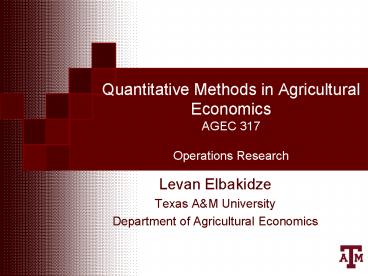Quantitative Methods in Agricultural Economics AGEC 317 Operations Research
1 / 20
Title:
Quantitative Methods in Agricultural Economics AGEC 317 Operations Research
Description:
An acre of land under corn gives 100 bushels of corn. ... 1000. LA. Miami. Denver. Miami. Denver. Cost. Distance. Let LD -- # of cars shipped from LA to Denver ... –
Number of Views:290
Avg rating:3.0/5.0
Title: Quantitative Methods in Agricultural Economics AGEC 317 Operations Research
1
Quantitative Methods in Agricultural
EconomicsAGEC 317Operations Research
- Levan Elbakidze
- Texas AM University
- Department of Agricultural Economics
2
Mathematical Programming --- Flexible
optimization framework where objective function
is optimized subject to equality and inequality
constraints.
-- Maximizing profits, Optimal warehouse
location, Optimal routing, personnel scheduling,
minimizing feed costs, inventory management, risk
minimization, investments decisions,
3
Linear programming Integer Programming Quadratic
programming
A Trivial Farm Model for Profit Maximization
100 acre of land. Can grow corn and wheat. An
acre of land under corn gives 100 bushels of
corn. An acre of land under wheat gives 60
bushels of wheat. Prices Corn 2 and wheat 3
per bushel. Assume zero production costs and
determine optimal mix of the two crops.
4
Step 1 Identify resources, variables, and
constraints Step2 Model construction 2.1 define
variables and their units 2.2 set up
constraints 2.3 set up the objective
function Step 3 Write the model structure Step 4
Solve the model
5
Ozark farms uses at least 800 lbs of special feed
daily. Special feed is a mixture of corn and
soybean meal with the following compositions
The dietary requirements of the special feed at
least 30 protein and at least 5 fiber.
Determine minimum-cost daily feed mix
6
Obj MIN 0.3C0.9S Constraints
CSgt800 0.09C0.6Sgt0.3(CS) ?
0.21C-0.3Slt0 0.02C0.06Slt0.05(CS) ?
0.03C-0.01Sgt0 C,Sgt0 Solution C470.6 lb,
S329.4lb
7
Exercise 18
You produce Three types of tables, fancy, regular
and economy. Labor requirements fancy 4 hrs,
regular 3 hrs, Economy 2 hrs. Material
requirements fancy 10 square-feet, regular 9,
economy 6. Total labor available 40 hrs Total
materials available 500 Prices fancy 100,
regular 80, economy 60 You have to produce at
least 2 fancy and/or regular tables. Set up a
linear programming problem.
8
Shadow value (or shadow price) value of
relaxing a constraint Slack variables for each
inequality constraint. Turns inequality into
equality. Shows the amount of unused resource at
the optimum
9
Production Process Rays in Linear Programming
10
Production Isoquants in Linear Programming
11
Determination of the Least-Cost Production Process
12
Optimal Input Combination with Limited Resources
13
Constraint Imposed by Limitations on Input A
14
Feasible Space
15
Graphic Solution of the Linear Programming Problem
16
Transportation Model
Plant locations LA, Detroit, New
Orleans Distribution Centers Denver Miami
Demand Denver 2300, Miami 1400 Plant Capacity
LA 1000, Detroit 1500, New Orleans 1200
17
Let LD -- of cars shipped from LA to Denver
LM -- of cars shipped from LA to Miami
etc.
Cost 80LD100DD102ND215LM108DM68NM
LDDDNDgt2300 LMDMNMgt1400 LDLMlt1000 DDDMlt1500
NDNMlt1200
18
Production Inventory Management
of bottles
Sales
InventoryProduction sales
Jan June Aug.
Production capacity does not equal sales or
demand every month Inventory can bridge the gap
but it may cost to hold inventory Production and
inventory cost may be different every month
19
3 Months production-inventory planning
20
(No Transcript)































